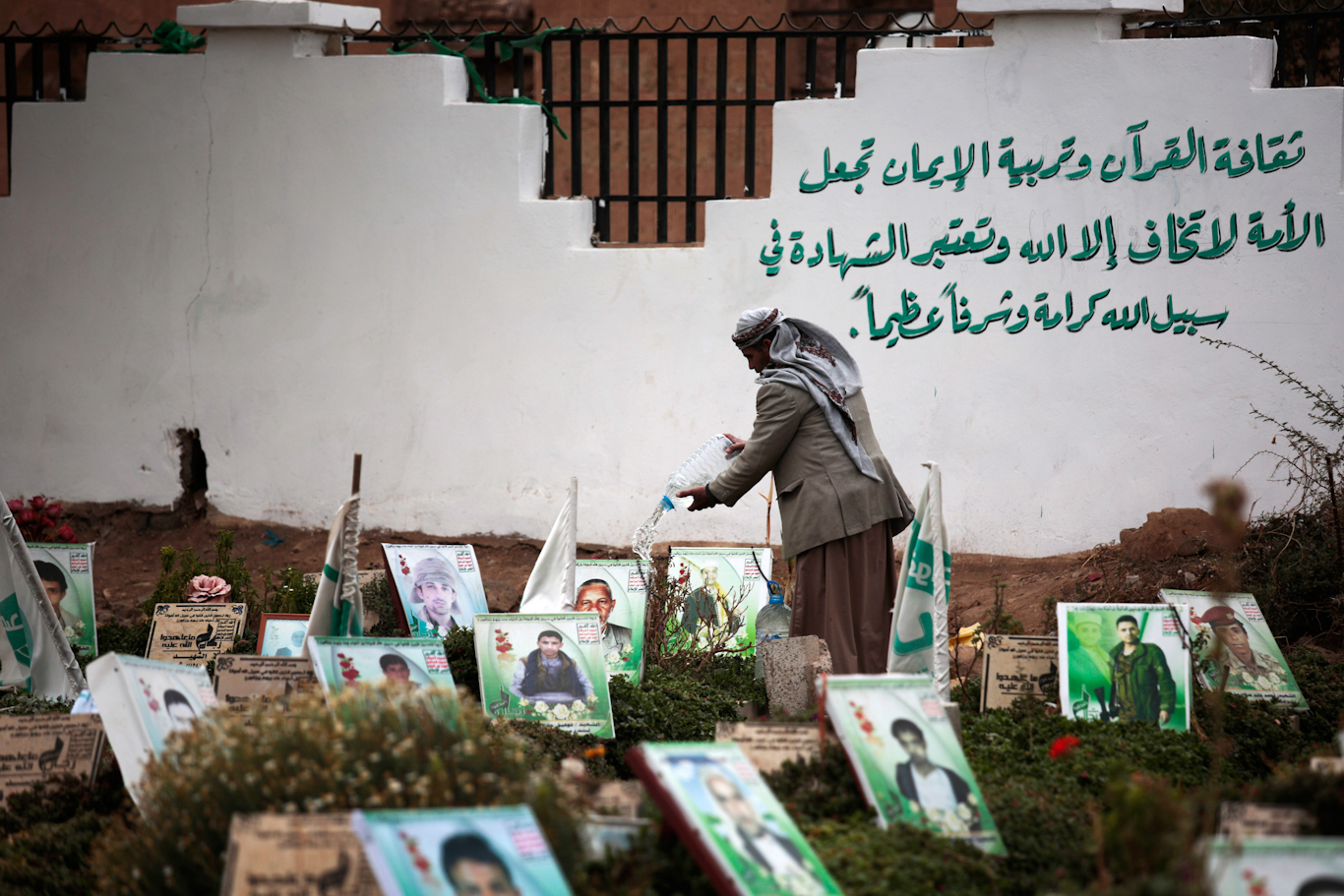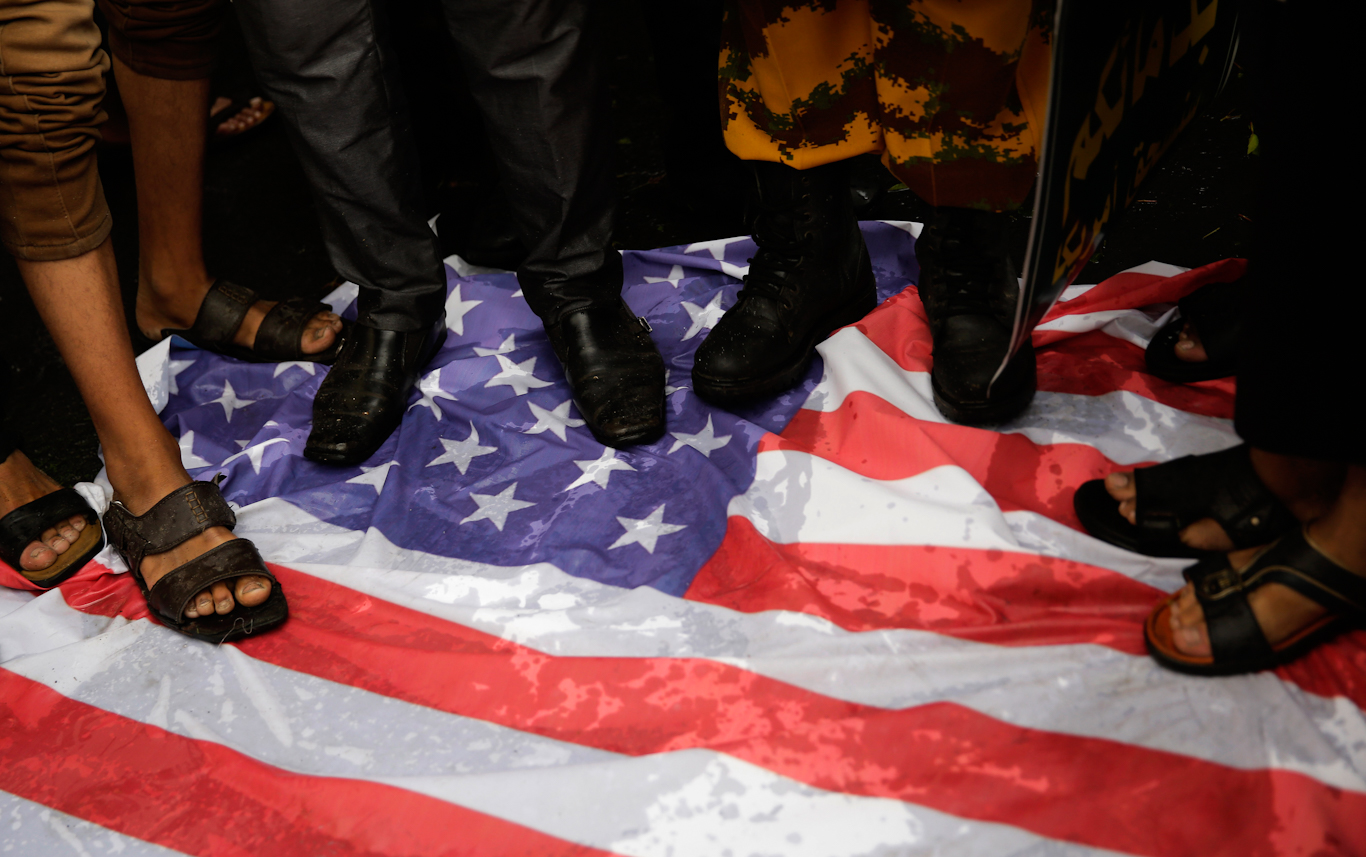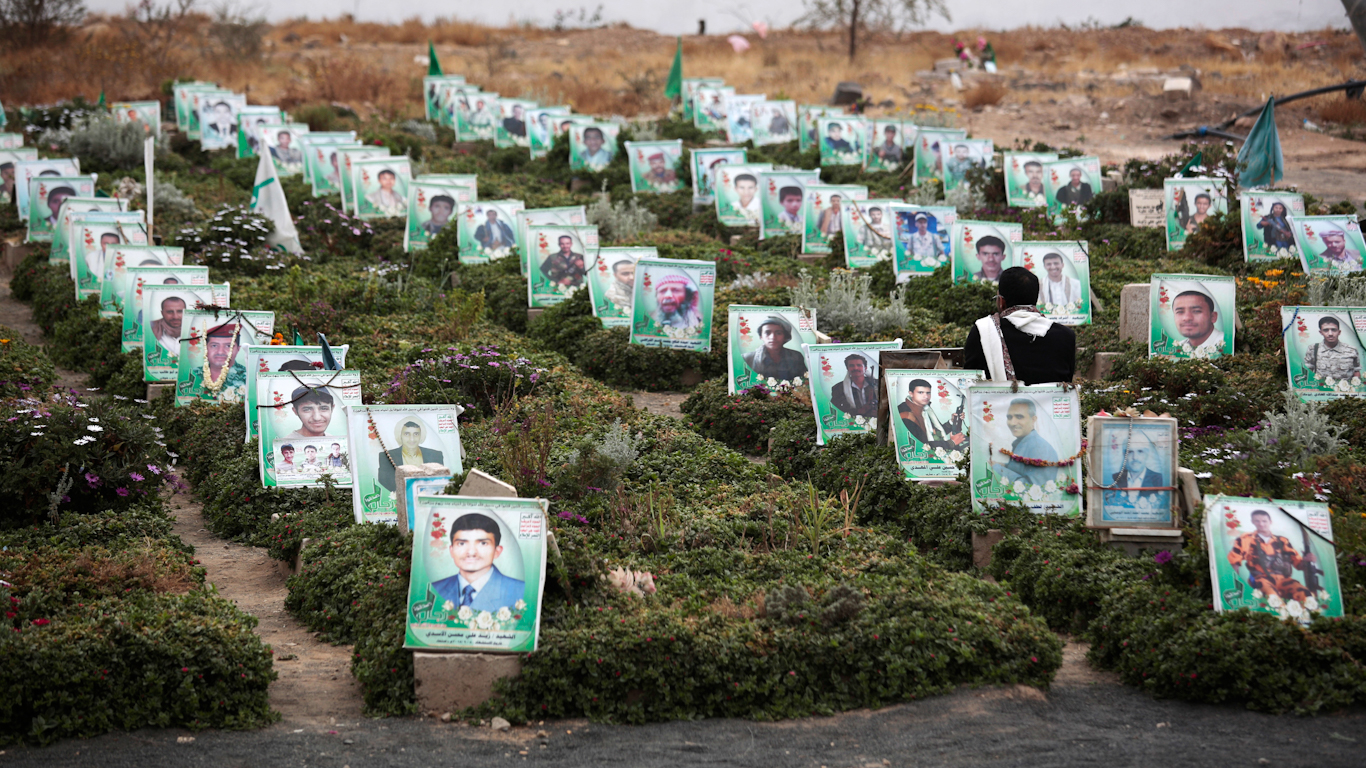As the ongoing war and blockade against their country enters its sixth year, Yemenis are commemorating the annual Martyr Week amid an increasing feeling of hatred and resentment towards the United States, a feeling never seen at this level in the war-torn country.
In Yemen, a country far from the prosperous and bustling United States, the size of cemeteries has increased dramatically in the past five years, with new burial sites springing up to house victims of the weapons supplied by western countries, particularly by the United States, as well as the blockade, hunger, and disease that have accompanied them.
Ebtisam al-Harazi is just four-years-old, but as she stands atop her father’s grave amid a meadow of martyrs’ shrines, she knows who sleeps in the soil beneath her and the type of weapon that killed her father. “This my dad,” she says, as she kisses a colorful portrait of her father perched upon a coffin-shaped mound beyond a low stone wall.
Ebtisam’s father was killed by a Saudi warplane that delivered a U.S.-made bomb to the al-Sultan zone in the Old City of Yemen’s capital Sana’a in July of 2015. The attack killed and injured dozens of residents and caused tremendous damage to the city, built long before the United States even existed as a nation.
Fatemah, Ebtisam’s widowed mother, packed flowers to place at her husband’s memorial site, “It is the martyr’s anniversary. We come here to share old times with our loved ones,” she told MintPress. Their visit to the memorial has become a tradition since 2015 when the war against their home began.
This particular memorial sits in 50th district, in the middle of Sana’a, and is the resting place of more than 1,000 men, women, and children killed by the Saudi-led coalition along with countless bodies of fighters killed in clashes against coalition forces. The shrines are ensconced with ornamental flowers and small trees planted by visitors who have come to honor the deceased.
The annual feast of the Martyr Week, an important occasion marking the beginning of December, kicked off in Yemen last Wednesday. It has become, for Fatimah and other Yemenis, a somber occasion amid a suffocating blockade, the threat of epidemics, rubble, tears, and the fear of the may lie ahead.
For eight consecutive days, residents in northern Yemen commemorate those that have been killed by the Saudi-led coalition. Program include held exhibitions, public festivals, and meetings where victim’s families discuss how they cope with the war.
To keep the history of the martyrs alive, officials visit the families of victims to show sympathy. Food and gifts are distributed in abundance to orphans and widows and groups of officials visit graveyards housing victims of the war. There are more than 480 such graveyards spread over several regions in Yemen according to Martyr’s Foundation in Sana’a.
At least 450 exhibitions have been opened in the country. Public streets, city walls, schools, and government buildings in all districts are flooded with millions of flyers and posters bearing the images of civilians and fighters alike that have fallen in the war. Faces stare down from billboards on every highway, and the radios play Zawamil — patriotic battle hymns — day and night. While national TV broadcasts songs that glorify their sacrifices and threaten revenge.
"The exhibition shows something terrible but inspiring. Through the exhibition, people will understand how cruel the Saudi-led Coalition war supported by the U.S. is, and they will also know how brave and strong Yemenis are,” 70-year-old Ali told MintPress as he sought out his son’s photo to show to a group of visitors. The photo of his son was in the midst of crowded collage of pictures hanging on the wall of the al-Janoub Martyrs exhibition in the 70th district south of Sana’a.

A Yemeni man pours water on the grave of his relative killed in Yemen’s ongoing conflict, during “martyr week” at a cemetery in Sanaa. Hani Mohammed | AP
In Sadaa, which lies in Yemen’s north near the Saudi border, dozens of exhibitions and memorials symbolize society’s deep gratitude towards the country’s war heroes and martyrs. The ancient city, among the world’s oldest human-carved landscapes, has been devastated since Saudi Arabia declared it a military zone. Inside the city’s exhibition, visitors flow in an organized way to see more than 11,0000 photos of the fighters, women and children who lost their lives in the war
In the exhibition hall, videos show rescuers recovering children from rubble, massive scenes of destruction, martyrs reading their commandments and asking survivors to remain steadfast against Saudi Arabia, and a svelte, meek-looking man stepping up to a lectern in Washington. “The Kingdom of Saudi Arabia launched military operations in Yemen,” he says. The man in the video was none other than Adel al-Jubeir, the Saudi ambassador to the United States. The clip showed the first time Saudi Arabia’s war against Yemen was officially announced, just hours after the first bombs were dropped on the city.
For most Yemenis, the Saudis’ choice of Washington as the place to announce the war had meaning. They saw it as a deliberate signaling of complicity between the United States and Saudi Arabia. Al-Jubeir emphasized in his speech that the Kingdom had consulted very closely and very intensely with the United States before launching its war.
In Dahyan, a city in the far northwestern stretches of Yemen, where a U.S. laser-guided bomb dropped by a Saudi Arabia struck a school bus on August 9, 2018, a large crater is still visible near a fruit-and-vegetable stand in the suq. A brick wall a few yards from the scene features large hand-painted letters in both English and Arabic that proclaim, “America Kills Yemeni Children.”
More than 100,000 people have been killed in Yemen just since January 2016 according to a new report by the Armed Conflict and Location Event Data Project (ACLED), however, the number is likely to be closer to one million if deaths from epidemics, diseases, hunger and from fighters who have been killed from both the resistance and local mercenaries are taken into account.
"We hate nothing more"
Ebtisam’s father, who spoke English fluently with American accent, was a tour guide until 2014, he had a shop near Bab al-Yaman (The Gate of Yemen) in the Old City of Sana’a which sold the famed Yemeni agates, a metamorphosed and hardened version of quartz that has been renowned as a gemstone in southern Arabia since ancient times. In 2015, the shop was closed due to a series of attacks that hit the ancient city over with over 30 airstrikes.
According to his family, he was a jovial man with many friends from the United States and Britain. In the sitting room of their small home, three charming photos once hung on the wall. The photos showed Ebtisam’s father posing with his American friends. After he was killed, the family replaced the photos with portraits of the man they lost and banner adorned with the now-infamous slogan, “Death to America".
"That was before the war. Yes, we had liked the United States, but now, there is nothing we hate more than this country,” said Fatimah. Regrettably, this is the prevailing mood in the north of Yemen. Most of the area’s residents are keen to express feelings of hatred towards the leaders of the United States. Phrases deriding the U.S. adorn everything; photos of victims, walls, clothes, coffee shops, car showrooms, and even shopping malls.
 Yemenis stand on a representation of the U.S flag during a protest against the U.S. assassination of Qassem Soleimani, in Sanaa, Yemen. Hani Mohammed | AP
Yemenis stand on a representation of the U.S flag during a protest against the U.S. assassination of Qassem Soleimani, in Sanaa, Yemen. Hani Mohammed | APBefore the war began, the Yemeni community, especially in northern Yemen, was friendly and most people had favorable attitudes towards Americans. American tourists, businessmen and diplomats were a regular fixture in Yemen. In Sana’a, local residents warmly welcomed American visitors to their salons by pouring a glass of single-malt scotch or sharing food and fun times. But now, Sana’a is embracing “Death to America” as their slogan, scrawled as graffiti on the capital’s walls. Thanks, in large part, to U.S. policy in Yemen.
Everything has changed as the hate against foreigners, particularly the leaders in the United States, has rapidly increased throughout Yemen because of western involvement in Saudi Arabia’s war or from the death of innocents killed by drones under the pretext of targeting al-Qaeda. Policies that predate the Trump administration.
Although Yemen has long suffered from instability, warring tribal factions and a long-standing al-Qaeda presence, foreigners including Americans, were welcomed in the country without restrictions on their movements. Now, they are seen with suspicion and are treated with caution for fear that they may be spies. Even aid workers are not immune.
“The slogan Death to America, as we see it, is not against the people of the United States but against the U.S.’ policies in our district,” a Houthi leader said as he gave a speech in front of a large audience at a Martyr Week exhibition. Most Yemenis differentiate between the Americans who support Saudi Arabia and those who reject the war. But to angry families who have lost loved ones in Saudi-coalition attacks, it can sometimes be difficult to differentiate.
The United States claims that it does not make targeting decisions for the Saudi Coalition. But it does support Coalition operations through training, arms sales, the refueling of Saudi combat aircraft, and the sharing of intelligence. Those arms sales include precision-guided missiles as well as precision guidance parts used on the warplanes blamed for civilians casualties in the Saudi-UAE’s military campaign in Yemen.
Furthermore, as a result of the U.S. involvement in the war and the economic blockade against their country, Yemenis have been forced to reinforce their relationship with Iran, one of the only countries that has been consistently outspoken in its opposition to the war. Now, at the annual feasts of Martyr Week, photos of Iranian General Qassem Soleimani and Abu Mahdi al-Muhandis, who were assassinated in a U.S. airstrike at Baghdad International Airport on in a January 3, are proudly displayed.
Ten of thousands of Yemenis staged a symbolic funeral ceremony in the country’s cities including in Hodeida, Sana’a and Sadaa to commemorate Soleimani and Muhandis, chanting that their blood is neither is Iranian or Iraqi, but rather belongs to all freedom-loving nations targeted by the United States.
Source: MintPress News
By: Ahmed AbdulKareem



























